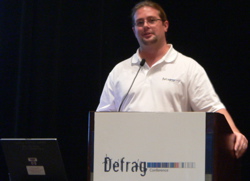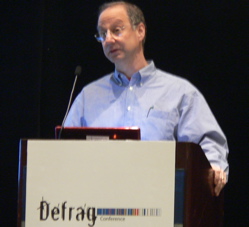The whole idea of doing this event, said Eric Norlin in his opening remarks, began with an email from Brad Feld. He said he admitted he really didn’t understand it, but decided "maybe there’s a conference there." Big laughs. He later said that part of the thinking was also to "get the band back together" after Esther Dyson’s longstanding PC Forum conference was retired. He’s done a nice job — there’s an awesome collection of big thinkers here. 
David Weinberger, author and Fellow, Harvard’s Berkman Center, took the stage to deliver a new talk he called "The Rise of the Implicit." Basically, we tend to focus too much on the eplicit. Computers do explicit stuff, whereas humans by nature are creatures of the implicit, which is the social stuff. Whereas computers have forced us to "infomationalize" everything, it’s links that are fully social. "Links are a type of writing," said Weinberger, "which is a lot different from the fundamental vioew of information." 
In fact, he said, "the Web itself is the counter to the traditional view of information." Links connect us, they’re "the joins in a world that’s overloaded with information … we’re together writing the world … they’re the gestures of what matters to us." In a lively question and answer session following, Jerry Michalski spoke of how we’re headed from a world of nouns to one of verbs, and asked Weinberger if his views aren’t overly optimistic. "The Web is working very well. It’s about connectedness, it transcends language," he said. "It works because we’re fundamentally not information machines." He’s very optimistic about this, though pessimistic about other aspects of the Internet. "We’re insanely social and insist on connecting," Weinberger said in closing. "Take Twitter, for example. It looked like a parody of the Web — 140 characters, are you kidding me? But now I love it — it’s fantastic!"

Leave a Reply